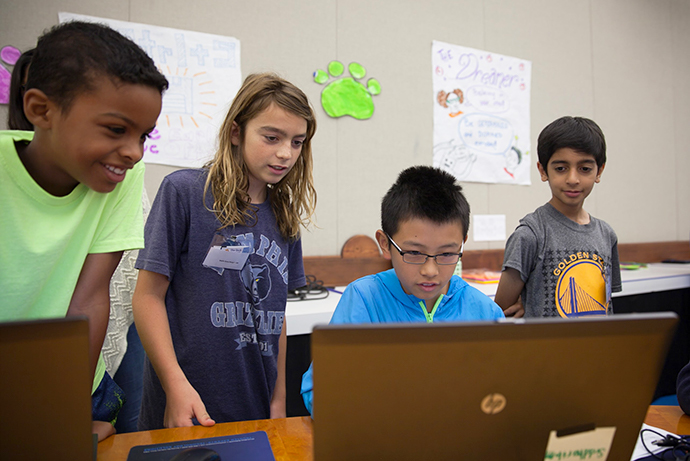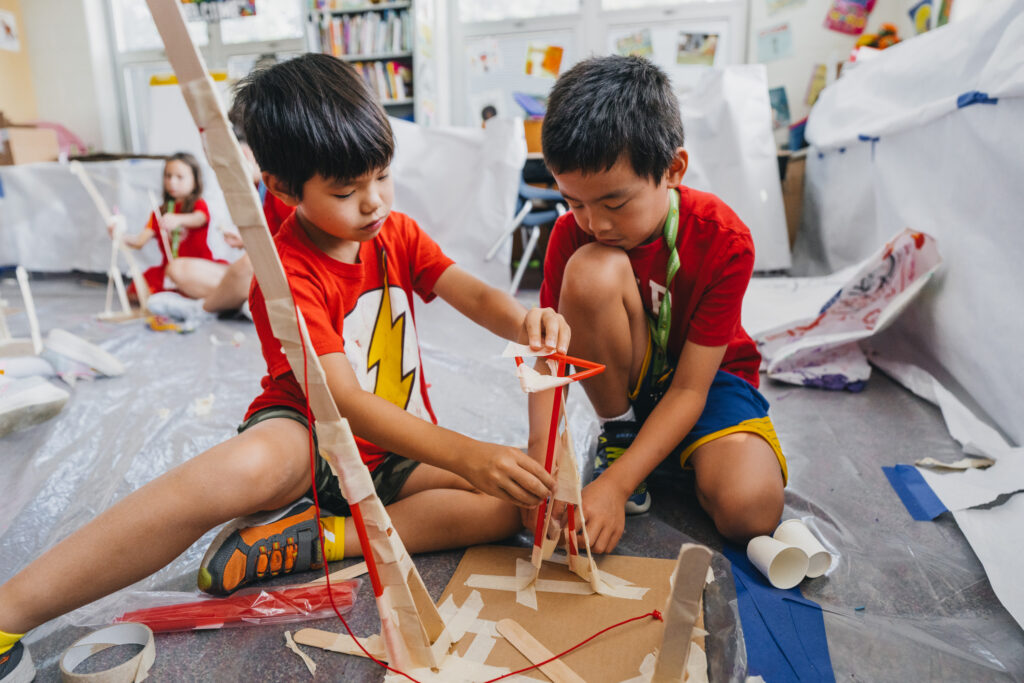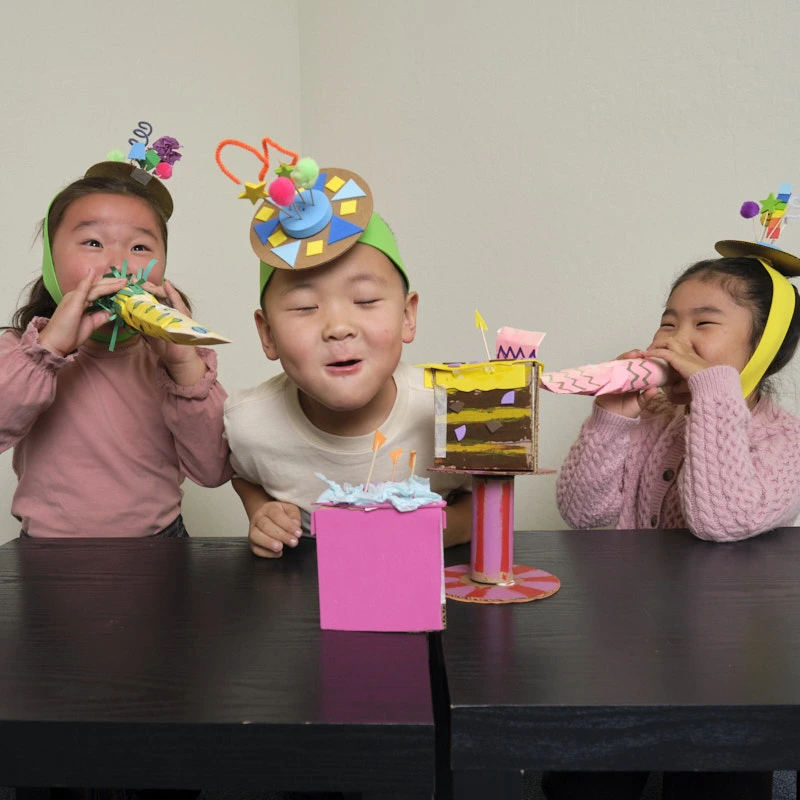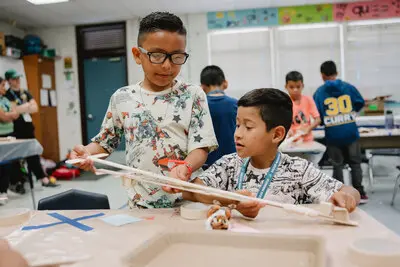Most parents can’t help but notice a big disconnect between how they developed the right learning skills growing up, versus how their children do today. An old favorite—Poḱémon—is a prime example. Millennial parents probably remember playing with the collectible cards when they were young while stealthily learning reasoning, creative thinking, communication skills and crucial collaborative abilities under the guise of an amazing game. Now, their own kids are capturing and battling with Pokémon in the wild using augmented reality apps. All the while, they’re learning those exact same skills, and more.
Technology hasn’t changed the 21st-century learning skills that kids need to thrive—it has just changed the way they are learned. The fundamentals of critical thinking, problem solving and working with others are still the tools that will launch the next generation of innovators. The difference is that now technology is an integral part of the development of these crucial skills and by embracing it, parents can help nurture that growth.
USING IMAGE RECOGNITION IN DEVELOPING REASONING SKILLS
Reasoning is the ability to take information and use it to draw logical conclusions. While it sounds simple, the development of proper reasoning skills is quite complex and kids do it at different rates. For some, it might feel very familiar. Others need to work a bit harder. For both, it’s a skill best taught through practical application.
A great way for parents to help their kids sharpen this skill is to design activities around having children collect and identify objects. Most parents remember a common fall activity that taught this. Students gathered Autumn leaves, identified them, and then pressed them into wax paper to preserve them as a typical grammar school science project.
Kids today can do that with a technology twist that eliminates the mess. They still take a nature walk with a goal of collecting specific leaves. Only now, they can use a smartphone camera along with an image recognition app to record their findings. This provides a fun family activity that teaches reasoning skills while keeping kids interested in nature and technology.
CULTIVATING CREATIVE THINKING WITH GAME DESIGN
Creative thinking isn’t just about imagination. It teaches kids how to problem solve. Innovation requires the ability to come up with unique solutions or to look at things in a new way. Without creative thinking, there would be no innovation, and the world would lose some of its amazing complexity.
Parents today probably developed a lot of their creative thinking ideas during their childhood playtime, as they devised new games to play with their friends. Tag, hide-and-seek, kick-the-can—all these games were ones born from someone’s imagination. However, today’s kids have so many entertainment options available to them, they don’t need to think creatively to come up with games. If they want a challenge, they can just turn to video games.
Parents can use technology to inspire their child to come up with a new idea. Instead of playing the mobile game, why not design one? Parents can challenge their child to create a concept, character and goals for a game and use a variety of easy online tools to develop them. For kids who find the idea really intriguing, there are more than a few excellent courses in mobile game development aimed at young minds. By using one, kids get to experience being a creator rather than just consuming it as a recipient.
USING DIGITAL STORYTELLING TO FOSTER COMMUNICATION SKILLS
Even a child with the best reasoning and creative thinking skills will have trouble thriving if they’re unable to communicate their ideas effectively. Communication isn’t just about the words used. It’s about the tone, the presentation and the confidence to share a message. It’s also a skill that needs to be adapted as the way people communicate evolves.
For most parents, their earliest example of developing communications skills was that old grade school favorite show-and-tell. It was a fun opportunity to show off their favorite toys or mementos, and it installed early lessons on how to tell a story. However, how we communicate has changed with advances in technology.
It’s important for parents to encourage children to experiment with digital storytelling. Digital storytelling is a new multimedia form of communication that encourages children to use a variety of tools to share their story like video, images, audio clips and more. Kids can publish these stories online where they can continue the conversation. Digital storytelling is a way to encourage children to have well-rounded communication skills, not just in writing and speech, but in their online imprint.
RAISING MONEY FOR A CAUSE WHILE TEACHING COOPERATION
Working with others is a necessary part of life, whether at work, school or just during family time. As children, we’re taught about the importance of sharing as a means of nurturing cooperation. Today, in our globalized environment, cooperation is even more important.
Today’s kids are more aware of the world outside their immediate neighborhoods. They may see stories about children in other countries struggling with poverty, disease, war and other terrifying things. One way to give them a sense of control over all that conflict is to encourage them to get involved by giving back.
This can also be a fun family effort. Kids can find a cause they want to support and then use online crowdsourcing sites like Go Fund Me and other social media platforms to help raise money, or even just awareness. This encourages them to cooperate with a diverse set of people to reach a common goal, all while instilling a sense of social responsibility.
NURTURING 21ST-CENTURY LEARNING SKILLS WITH 21ST-CENTURY TECH
Parents shouldn’t let a technology divide keep them from teaching their kids the fundamentals of reasoning, creative thinking, communications and cooperation. Instead, they can use technology to update the methods from their childhoods. There are many online resources parents and kids can use together to develop a foundation of success.
Creating activities that tie the digital and physical world together can help parents better connect with children. It also helps to underscore the importance of technology not just as a tool, but as a critical part of society. By establishing strong 21st-century learning skills in their children, parents can help support the next generation of innovators.
Galileo provides a wide range of resources for parents who want to nurture learning fundamentals. Check out these opportunities for innovative summer camps in your area: San Francisco, Southern California, and Chicagoland. Sign up for our mailing list to keep up-to-date on our camp happenings, innovation resources and registration information for our upcoming 2019 camp season.



